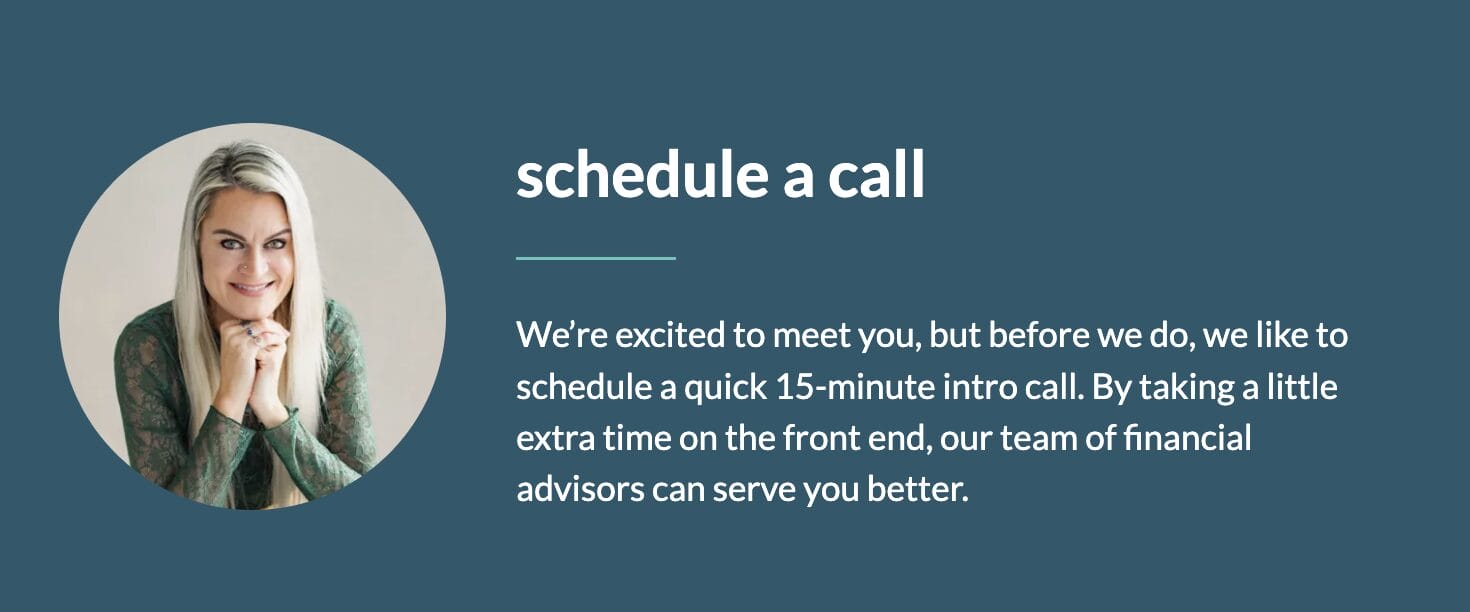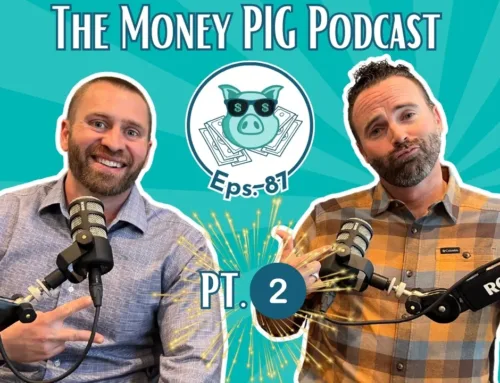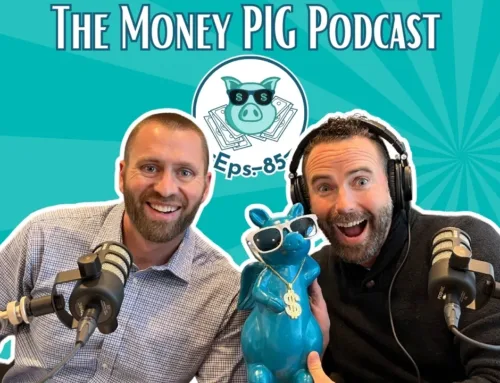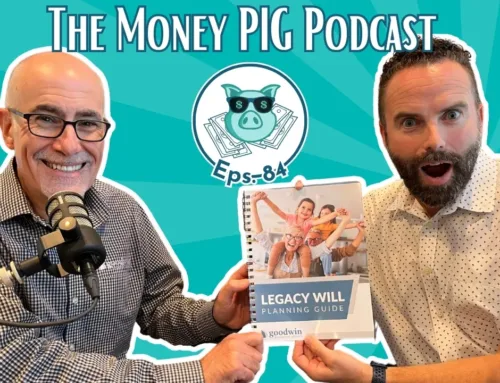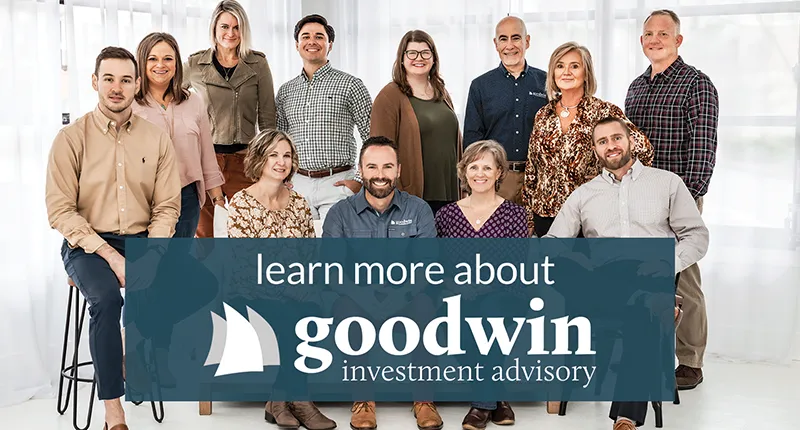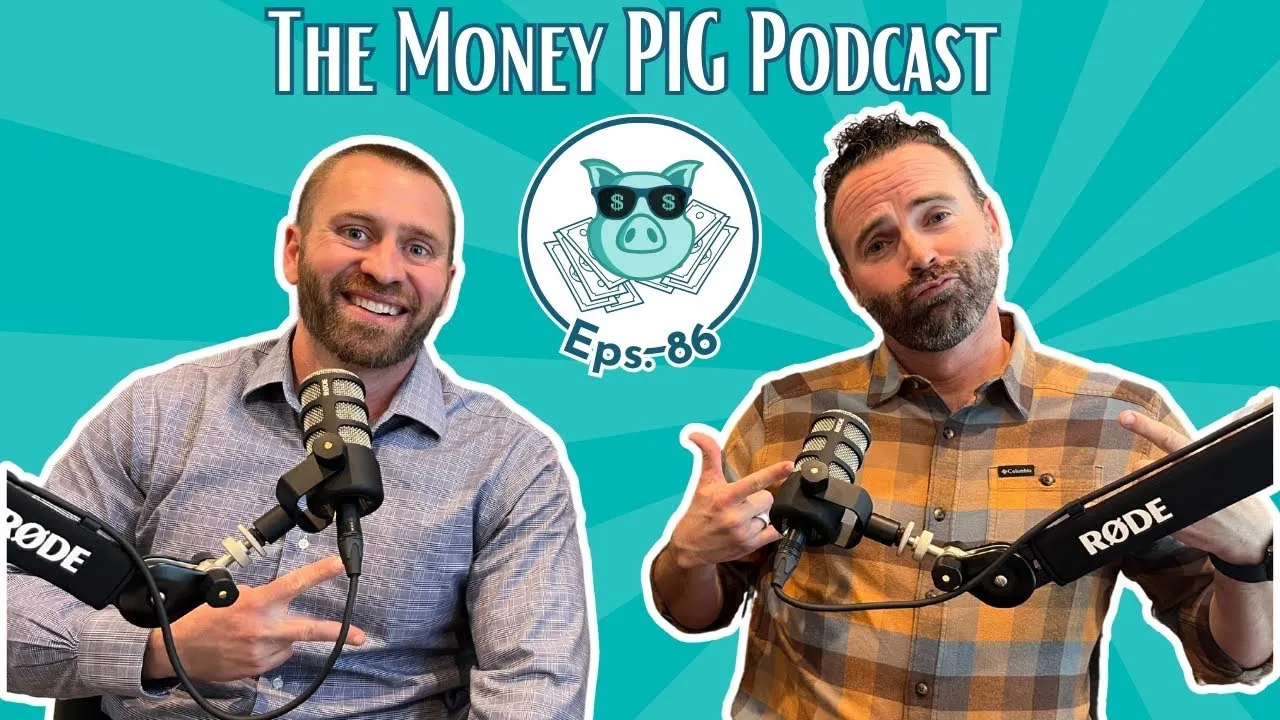
Link to Youtube –
https://youtu.be/FyVAcz7o3Vw
Link to buzz sprout –
https://moneypig.buzzsprout.com/2136084/episodes/16806194-episode-85-fisher-vs-goodwin-w-guests-justin-pitcock-john-pratt
In this episode of the Money Pig Podcast, Tim Goodwin and special guest (and outdoorsman extraordinaire) Justin Pickock — aka Elmer Fudd — kick off a two-part series diving into 10 Pro Tax Planning Tips for Early Retirees. Whether you’re planning your early exit from the 9-to-5 grind or already retired, this episode is packed with strategic tax-saving wisdom that can help you keep more of what you’ve worked so hard to build.
They cover the first 5 tax planning tips, including:
- Understanding the 3 types of tax buckets
- Taking advantage of low tax brackets
- Smart timing for Social Security
- Managing Required Minimum Distributions (RMDs)
- How to avoid early withdrawal penalties
You’ll also hear some fun stories from the outdoors, cold plunges in the wilderness, and a few dad jokes to keep it light.
Want the full list of tips plus a downloadable checklist?
Check out our blog:
10 Pro Tax Planning Tips for Early Retirees
No email required. No strings attached. Just solid advice.
Don’t forget to subscribe, like, and hit the bell to get notified when Part 2 drops.
For personalized financial guidance, schedule an schedule an intro call with our team at Goodwin Investment Advisory in Canton, GA. Our CFP® professionals can provide advice and help you navigate how to invest your wealth and plan for your retirement. We’d love to help you live out your legacy!
Goodwin Investment Advisory is a Registered Investment Advisory firm regulated by the Securities and Exchange Commission in accordance and compliance with securities laws and regulations. Goodwin Investment Advisory does not render or offer to render personalized investment or tax advice through the Money PIG podcast. The information provided is for informational purposes only and does not constitute financial, tax, investment or legal advice.
The trascript below was created by AI and has not been edited.
All right, welcome back to the money pig podcast. We’re super excited today to have none other than Elmer Fudd, Justin Pickock back in action with us. Good to see you, Justin. you Doing great. Doing great. Yeah. So we I don’t know, like we I need to make sure that everybody understands these nicknames like calling you Elmer Fudd. We’ve explained it before. But if this is their first podcast, because they’re like, man, the tax podcast must be the best one to start with. Why do we call you Elmer Fudd? I love to hunt. do? Oh yeah. Man fish. Just try to get that wascally wabbit. That’s right. That’s right. Awesome. Well, today we’re going to be talking about 10 pro tax tips for early retirees. So this is actually a cool little checklist that we have. We’ll be going over this and we’ll share how to get it as well. Before we do, Justin, share something with the audience that they may not know about you. man, you asked that last time. gotta come up with something new. Keep it fresh. Okay. Keep it real. I’m just drawing a blank right now, but I mean, I don’t know. Just, you know, married, got two boys and yeah, just love the outdoors. I don’t know that that’s necessarily new, but. So you guys were out of town last week. You went up to your cabin in the wood, which is affectionately called boars. And there was something involved with water. heard that. So you want to share that? It was winter break. And so my oldest is out of school. And of course, he wants to do anything that’s like macho. And so he’s like, Dad, let’s let’s get in the river. Let’s cold plunge. So we built a fire on the Jacks River up in the Cahutta wilderness. and we cold plunged. had a big fire so it was you know like had the ability to warm up. plunged. How long was he in that water? Well he’s six. Not long. Okay. Totally submerged. Totally. yeah. That’s super impressive. That’s super macho. You tell him. yeah. Mr. Tim said you are a macho man. know gosh that cold water leaves you feeling like energized. You’re ready to go. Totally does. Yeah. It’s like Red Bull and espresso. yeah and it happens in like 30 seconds. Tim Goodwin (02:09.434) Yeah, for two seconds. So that’s great. I’m glad that you guys are out there outside making it happen. So I did want to ask you, or I wanted to share with you about, you know, my childhood. like you’re your your own dad, you’re taking them coal plunging. But in my my childhood, my dad used to roll me down the hill in tires. God. Those were the good years. So that’s what happened. Your tires. I was like, there it is. Just making that up. Shout out dad, guys. Full disclosure, my dad did not roll me down in tires, but that’s my dad joke to get us started. So, all right. So let’s come on back because I know everybody was just super excited to hear us talk about our pro tax planning tips. And the reason why, why do we care? Why do we take the effort to understand this and have a podcast about it? And taxes are really important. It’s not how much you have, but it’s how much you’re left with. And retirement, it’s, you know, people have these, save up a big nest egg, but if a third of it goes to the government, then what are you really left with? Right? It’s not as big as you thought it was. Dang. So like take those quotes right there, Angela, like snapshot that stuff on, on X and social media. Those are some really good quotes. It’s not what you have. what you’re left with and the government’s going to take our third. So how do we keep as much of what you’ve got as possible and So there’s, that’s a good planning opportunity. And if we start planning early enough in life, then we can really set yourself up for success where you get to keep close to a hundred percent that the government doesn’t get a whole lot. So that’s, that’s the goal. That’s the purpose. I think, I think I’ve found, I don’t know if you found this advising clients over the years that there’s a little more of a focus of like when you’re earning and you’re working the hustle and the income and the stashing it away, when you get like closer to retirement or you’re right, like early in retirement, all of a this is big shift from not can I make more income, not can I save more, but how do I pay less taxes? How do I, how do I, know there are strategies out there. a lot of times too, I think clients feel like there’s all these secrets and there’s all these hidden things and all these loopholes. It’s not so much that it’s just being aware of the different strategies and the timing that comes into play. Right. Okay. So I will share with the audience, this is, there’s a really cool blog. Tim Goodwin (04:35.174) that we have out. It’s called 10 Pro Tax Planning Tips for Early Retirees. So go to GoodwinInvestment.com. If you click on the Tax Planning Services page, you’ll see that blog. And then you can download this checklist for free. You don’t even have to give us your information. You can be completely incognito. So we’re going to break this up into two different episodes. We’re going to go over the first five and then we’ll bring you back and do the second five. might even be wearing the same shirt for that second set. know, be weird if it happens. weird if you’re wearing the same shirt for episode two. Okay, so let’s dive in here. Why is it important to understand how your financial resources are taxed? So there there’s three different tax types. So there’s tax deferred, taxable and tax free. Tax free is my favorite, Justin. Oh yeah, my favorite too. but the we so we can actually get the the first two categories I mentioned tax free as well, if we plan things properly. And so, let me just give some examples of like what each category is. So, you know, tax deferred would be like your pre-tax 401k or an IRA. Your taxable would be like that non-retirement account, the brokerage account. And then of course tax free would be your Roth IRA or Roth 401k or HSA. So, you know, you’ve got, different accounts that could fall into those categories. And if we build wealth in all three categories, you’re able to pull some from each and the right proportion so that each bucket, well, obviously your tax free is not taxed, but we can get some tax deferred tax free. We can get some taxable tax free, like realize some cap gains tax free. that, that like, that is a quick win from the audience right there. If, if, we’ll lose you after this first point of 10. This is a really, really great nugget of wisdom to take from advisors that have been doing this for decades, from wealthy individuals, is to be very intentional about understanding where your money falls within those three tax types. And if you really, if you go and look at it, you’re like, wow, I have everything in one tax type or everything across two tax types, you might want to consider having all three. Tim Goodwin (06:52.886) I’ve seen that clients have more options and I think you’re gonna be unpacking that more strategies when you have money in all three types. But certainly, if you just had one, you’d want the tax-free one, like the Roth that we were talking about. And ultimately, that’s the goal to get them there. But if you look back and you’re like, I have all a tax-deferred 401k and then maybe I inherited some money or maybe I saved it in a brokerage account outside of that and you have nothing Roth tax-free, that’s something to really start. Yeah, look at rock. Absolutely. Yeah, because you could be could be maxed out on the income to contribute to that if you don’t have it in your 401k. Alright, so let’s, let’s switch gears here and keep moving. So point two on our list of 10 is to take advantage of lower tax brackets. So this is going to be Maybe not something you’d be comfortable doing in between jobs because you have a tax bracket, but okay. You’re going to unpack that. also like if you’ve just retired, there could be this window. So unpack that for the audience. We get to work with a lot of folks that, can retire early. earlier than like the standard 65 that I think most people think of as, you know, the normal retirement age. But, when you’re in those kind of pre, we’ll call it pre social security years, you’ve got. a lower income and that’s an opportunity for Roth conversions. It’s also an opportunity to possibly realize capital gains and pay zero. so definitely don’t want to let those years pass you and you kind of, yeah, snuck some in there for free. Yeah. So, uh, this year you can, as long as your taxable income falls below basically $97,000, any cap gains that are a portion of that are tax or long-term cap gains are That’s for Mary Mary. Okay. And that’s 2025 everybody. right. Yeah. So that’s just a good example of how, um, you can realize some income and pay zero on it. So I’ve got a client that I’m helping right now. He’s, um, kind of in career 2.0. He’s trying to start his own business. He retired out of corporate America. And, um, so we’re trying to fund him starting this new business right now. So we just sold a lot of, uh, Tim Goodwin (09:04.75) a lot of assets in his brokerage account realized a bunch of cap gains, he’s probably not going to pay a dime in taxes on that. That’s awesome. Yeah. You definitely want to be aware of those. This is also like, we’re just going to kind of toot our own horn here real quick, but I think this is why it’s super helpful to not like, I get the DIYers, like I get, I get the audience. If you’re the do it yourself or you’re, you’re astute. Um, you know, you’re a savvy investor, but it’s a lot to have on yourself to make sure you’re in the right investments. you’re doing all the right things with taxes, all the right things with estate planning versus having a trusted, experienced licensed financial advisor who can remind you about these things. you know, Mr. John Smith, did you realize that your income’s lower this year? And if we realize some of these gains over here, you’d pay nothing. Like I had to admit, I try to keep a lot of things in my mind, but I would forget that and I can miss that, right? That’s what we get paid for. Yeah. clients will come in a lot. We’ll be doing their planning and we’ll be talking about the three buckets going back to the first question and they don’t have any Roth assets and they’re like, Hey, does your 401k let you contribute to a Roth side? And they’re like, Oh, maybe I heard about it or I don’t know. And they check in now it’s more common, right? Are you seeing it’s more common? It’s pretty soon it’s going to be required in all 401k points because the catch up contribution not to get too far in the weeds here, but You love getting in the weeds, it’s been waiting for those weeds. for folks that are contributing and know, participants in 401k plans, there’s a catch up contribution if you’re age 50 or older. that soon that catch up contribution is going to be required to be raw. Interesting. All 401k plans are going to have to offer raw. Let’s go. yeah, so there it is. If this podcast is your financial advisor, this is your financial advisor telling you. Maybe check on your sources and consider the Roth. Yeah. So consider the Roth. mean, we’re going to be looking at opportunities to convert pre-tax to Roth as well. So we kind of covered realizing cap gains when you can at the 0 % rate. But if we can convert pre-tax assets to Roth and pay very little, for example, right now, the current tax brackets go, you know, there’s a 12 % bracket, then it jumps up, up to the 20%. So, or 22 % brackets. So Tim Goodwin (11:24.504) there’s a big gap right there. gosh, let’s max out that 12 % range. you know, that’s, that’s a bargain. Cause later on, I mean, we would of course, you know, do the analysis of this, but in retirement, you might be in a higher rate. So. Yeah. And I would say that it’s not that every client ends up doing Roth conversions, but we feel like every client needs to consider it. Right. You’ve got to consider it. Everybody has got to consider. You know, should I do rock conversions? When would they make the most sense? It’s in, we’ll get to that here in a moment when it makes sense, but it’s, it’s not, you know, it’s not beneficial for everybody. And unfortunately, I think, you know, folks who are listening to other podcasts on this topic, there’s, there’s blanket advice out there and some folks are just blasting, like you need to convert everything to rock. Don’t do that. You need to have somebody analyze your situation. Because it’s not most, actually more often than not, it works, it’s not advantageous. But we need to at least see if it is given your situation. Absolutely. So let’s bounce over to Social Security. Okay, so Social Security is obviously, everybody understands, is a big part of retirement planning. It’s substantial income source. But I think managing the timing of this not only plays into like, do I maximize my income, but really plays into how you manage your taxes and your strategy around that. So what would, what would your feedback be around considering social security timing as it, as it relates to taxes? There’s kind of two considerations here. One is, you know, if you start social security earlier, then those are those earlier years, you’re not assuming you’re retired. You’re not pulling as much out of your investments. So if you started earlier, you’re leaving more of your investments alone to grow and compound for more years. So you end up possibly with a higher net worth. Now on the flip side and later in retirement, like late eighties, nineties, we see where if you had delayed social security, you would have a higher social security benefit. you’re. Tim Goodwin (13:42.284) needing to supplement that with less from your investment portfolio. So there’s, there’s this influx of where initially would be beneficial to start social security early, but in later years, it, it’s not. And the, we have to look at the compounding math and we have planning software that can help with that and illustrate for us in your situation does that early on advantage of starting early, taking less out of your portfolio. Outweigh the later on cost of having a lower benefit when you’re in your 80s and 90s compared to what your social security benefit would otherwise be Where you’ll have to pull more out of your portfolio in the late 80s 90s So there is kind of an influx and for some folks it is clearly advantageous to start here early for some folks It is more advantageous to start later. So we do that’s another one of those that we have to look at your exact situation And then, you know, gosh, we don’t, we don’t know when it’s our time to go, but, that, know, family history and you can, kind of weigh in that for yourself. Like, you know, gosh, where do I want my breakeven point to be? And, so a lot of times we see that kind of mid eighties, and, but again, we need to look at your situation to give you an informed answer there. Would it be beneficial to start early versus late? Yeah. And I was just going to say that, you know, to wrap up what you were saying there, the two biggest factors are life expectancy and it depends on what else you have. Right. Right. Cause it impacts that. yeah. So the second factor, uh, with social security timing has to do with ways social security is taxed. This is kind of the fun part where I get a nerd out a bit, but, um, 80, 85 % of social security. can be included in your taxable income. The other 15 % is always tax free. They’re talking, our government’s talking about changing the way it’s taxed. Maybe they will, maybe they won’t, but currently the way it is up to 85 % could be included in your taxable income. It depends on how much other income you have and that’s known as your provisional income. So if you have a lower provisional income, Tim Goodwin (16:03.522) then less of your social security is included in your taxable income. hopefully y’all are following following me here, but one of the strategies is can we have a lower provisional income relative to your social security income? So if you start early, your social security is smaller. If you delay your social security benefits larger and it’s a ratio. So it’s relative to the size of your social security benefit. So by delaying, you could have a larger, a delaying social security, you could have a larger percentage of your social security tax free. That’s one consideration. see. And 15 % of a larger number. Well, so it’s might not just be 15 % because it’s this kind of ratio between your provisional income and your social security income. If your social security’s income is larger, well then your provisional income could be a little higher without impacting how much of your social security is taxed. it’s a very complex calculation on computing how much of your social security gets taxed, but that’s one factor. And then this kind of ties back into the first couple of things that we talked about. Can we plan so that when you retire and start social security, that you’ve got things that are not included in your provisional income, such as distributions from a Roth IRA, or maybe it’s, the basis, the, the contributions, your basis in your taxable account. you know, let’s just, for example, let’s say you’re trying to pull 10,000 out of your brokerage account. It’s half gain, half, your investment, your original investments. So that’s, call that your basis. that 5,000 of basis is well, it’s tax free. That’s, was your cost, the 5,000 of growth. So pulling out of that taxable account has a low impact on your provisional income. Obviously pulling out of a tax deferred account, all of that money is going to increase your provisional income. So we want to strategize on, you know, building wealth in these three different buckets so that we can Tim Goodwin (18:23.81) have a optimized distribution strategy to get as much of your social security tax free as possible. Yep, that’s awesome. So to wrap that up, it’s not just about like what I was saying before about maximizing the income streams for your retirement, but it’s about strategizing which ones you’re pulling and when so that your overall tax picture is lowest. And we’ve seen without doing Roth conversions or considering these different sources that clients could end up in their highest income tax years of their life in retirement, right? Those later in their seventies because next question required minimum distribution. So what’s a way that the being, you know, cognizant of these tax strategies that are out there will help us reduce our RMDs and hopefully not end up in the highest tax bracket of our life in our seventies. know, early on it’s okay. Making that decision pre-tax or that you’re saving pre-tax or in the Roth. so obviously saving Roth would be money that was, there’s no required minimum distribution on a Roth account. So, that would help when you’re, if you get to retire early, maybe Roth conversions in those low income years. And then, you know, if you’re already, at RMD age, well, our kind of last option would be, if you’re charitably inclined to, donate money straight from your IRA. that’s called a qualified. charitable distribution, QCD. And so we help clients who do want to support their church or any other charity. They can send money directly from the IRA to that church or charity and it’s excluded from their income. It’s not a charitable deduction. It’s different. Right. It’s just, it’s satisfying a portion of their RMD and it’s excluded from their income. So when they go to do their taxes, let’s say that they took 10,000 for themselves. They gave $5,000 to Church or charity. Well, that $5,000 wasn’t even part of their taxable income that year. So it’s just excluded. Yeah, that’s great. And it’s interesting because I think when you first hear about RMDs, required minimum distributions, you’re like, cool. I’m going to at least get this RMD from my tax deferred IRAs. But what ends up happening once you get there is they’re kind of annoying. And they can get big because it’s a factor of your age and your account balance. Tim Goodwin (20:46.934) So as your account grows, well, that’s going to make your RMD bigger. But as you get older, because it’s a factor of your age, your RMD is going to get bigger. And so the older you get, that’s a larger and larger percentage of your pre-tax account that has to come out every year. Yeah. And that’s a lot that we help with with our clients is make sure they take those RMDs because if you don’t take them, it’s a 50 % tax. Right? Yep. On the missed RMD. missed. Yep. part of the RMD you didn’t take, maybe you didn’t take it all. And again, like you were saying, hopefully you’ve been working with a financial advisor in advance and doing things to strategically reduce those. So last question here on the one of two episodes on these 10 tax tips. So the fifth one here is avoid early withdrawal penalties. So why is that a pro-tax planning tip? Oh yeah, well. I mean, everybody wants to retire early, right? Or at least maybe from that original eight to five day job, maybe they’re going to something more meaningful and, that, you know, it’s passion driven, but, an IRA you’re, you can’t withdraw from under the standard rule until you’re 59 and a half. Now there’s a few exceptions to that rule. We help folks kind of work around that, but, your last employer’s 401k, you can start withdrawing from that at age 55. If you left it there. If you left it there. Right. So that’s something that if you’re considering rolling over a 401k to an IRA, you need to know about this and we need to talk about it is, are you in a situation where you might need to use that account? And actually we would not want to roll that over to an IRA in that case. Great. Yep. That’s great. Well, thanks for joining. If you are listening and you want to get the other five pro tax tips, can again, like I mentioned, go to our website, goodinvestment.com. You can go to the tax planning website, you can click on the blog and download those. Or you can wait for the next episode to come out where we go over the next set of five. But in true form as we sign off on the episodes, I always love sharing a little bit of what we’re grateful for. Tim Goodwin (22:57.422) And one of things that I’m grateful for, we had Kobe on here earlier, we talking about him being into fitness and exercise science. Your undergrad was exercise science as well. But I was out of town for a little bit. When you travel, I find it’s a little bit harder to have my regular fitness exercise routine in. But man, getting back home and getting back into the regular fitness, just always makes me, I’m grateful that I am healthy enough to exercise and that exercising itself just… It just not only makes me feel good, but I’m like, accomplished something today. Right. got it’s got the exercise. There’s a saying health is wealth. Health as well. There it is. There it is. So, that’s what I’m grateful for today. What about you, Justin? Gosh. so I said it Monday, like to the team, but, so last week was winter break and I know a lot of like other advisors, they, they don’t have a great team, but we do here. And so like, I could take the week off and spend. spend that time with my boys. And like I know that all of our clients are being taken care of. And so I’m just super grateful for the team that we have and the ability to do that. Awesome. Awesome. That’s great. Yeah, we do. We do have an amazing team here. I can certainly certainly echo that. So I also wanted to sign off and say thank you to our producer Angela and our content creator and Angela who’s doing it all. Tara, who Wrote this stuff, Angela made it super pretty and got up on the website for you guys to take advantage of. Thank you so much for listening. Everybody have a great day. Bye bye.
We will try to address your questions – add that part at 2 — uncertain time, tariffs are confusing lets get the advisors
